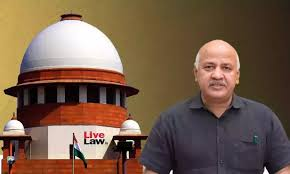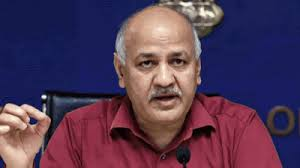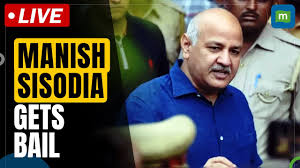Manish Sisodia: A Profile in Indian Politics and Education Reform
Manish Sisodia As a senior leader of the Aam Aadmi Party (AAP) and the Deputy Chief Minister of Delhi, Sisodia has been at the forefront of transforming the education landscape in the national capital. His journey from a journalist to a key political figure highlights his commitment to public service and innovative governance.
Table of Contents
Early Life and Career
Manish Sisodia completed his education at the Bharatiya Vidya Bhavan in Delhi and later pursued a diploma in journalism. His career began in the media industry, where he worked as a journalist and radio presenter. This experience in journalism honed his communication skills and provided him with a platform to engage with a wide audience on pressing social issues.

Entry into Politics
Sisodia’s foray into politics was driven by a desire to address systemic issues and bring about tangible change. His involvement with social activism began with his participation in the India Against Corruption movement, led by activist Anna Hazare in 2011. This movement aimed to combat corruption and advocate for the implementation of the Jan Lokpal Bill, a proposed anti-corruption law.
The India Against Corruption movement laid the foundation for the formation of the Aam Aadmi Party (AAP) in 2012, with Arvind Kejriwal as its leader. Sisodia emerged as a key member of AAP, sharing the vision of a corruption-free and transparent governance model. In the 2013 Delhi Legislative Assembly elections, AAP made a significant impact, and Sisodia won the Patparganj constituency, marking the beginning of his political career.
Role in the Delhi Government
As a minister in the Delhi government, Sisodia was entrusted with multiple portfolios, including Education, Finance, Planning, Tourism, Women and Child Development, Art, Culture and Languages, and Public Works Department. His most notable contributions, however, have been in the field of education.

Education Reforms
Under Sisodia’s leadership, the education sector in Delhi witnessed transformative changes that garnered national and international attention. Some key initiatives and achievements include:
- Infrastructure Improvement: One of the first steps taken by Sisodia was to improve the physical infrastructure of government schools. This included the construction of new classrooms, modernizing existing facilities, and ensuring basic amenities like clean toilets and drinking water. The goal was to create a conducive learning environment for students.
- Teacher Training and Motivation: Recognizing the crucial role of teachers in the education system, Sisodia focused on their professional development. Regular training programs were conducted to enhance teaching skills and methodologies. Additionally, efforts were made to boost teacher morale through initiatives like the Delhi Excellence Awards.
- Curriculum and Pedagogy: Sisodia introduced innovative teaching methods and updated the curriculum to make it more relevant and engaging. The introduction of the “Happiness Curriculum” and the “Entrepreneurship Mindset Curriculum” are notable examples. These curricula aim to foster emotional well-being, critical thinking, and entrepreneurial skills among students.
- School Management Committees (SMCs): Sisodia emphasized community involvement in school management. SMCs, comprising parents, teachers, and local representatives, were strengthened to ensure greater accountability and participation in decision-making processes.
- Focus on Holistic Development: Beyond academics, Sisodia’s policies stressed the importance of extracurricular activities, sports, and arts. This holistic approach aimed to nurture well-rounded individuals equipped with diverse skills.
indiaanfastearning.comDelhi excise policy: Supreme Court reserves verdict on Manish Sisodia’s bail plea 2024
Financial Stewardship
As the Finance Minister of Delhi, Sisodia demonstrated prudent financial management. He prioritized allocation of funds to critical sectors like health, education, and infrastructure. The Delhi government’s budget reflected a commitment to inclusive development and welfare programs, ensuring that resources were effectively utilized for the benefit of the public.

Challenges and Criticisms
Despite his achievements, Sisodia has faced challenges and criticisms. Political opponents have often questioned the efficacy and sustainability of his reforms. Issues such as bureaucratic resistance, implementation hurdles, and political opposition have posed significant obstacles. However, Sisodia’s steadfast dedication to his vision has enabled him to navigate these challenges and continue his work.
Recognition and Impact
Manish Sisodia’s efforts in transforming Delhi’s education system have received widespread recognition. International organizations and educational experts have lauded the Delhi model of education for its innovative approaches and positive outcomes. The improved performance of government school students in board examinations and the increase in enrollment rates are tangible indicators of the impact of these reforms.
Personal Life and Vision
Beyond his political career, Manish Sisodia is known for his simplicity and dedication to public service. He is often seen interacting with students, teachers, and parents, understanding their concerns, and working towards addressing them. His vision extends beyond immediate reforms to creating a robust and inclusive education system that can serve as a model for other states in India.
Conclusion
Manish Sisodia’s journey from a journalist to a key political figure underscores his unwavering commitment to public service and education reform. As the Deputy Chief Minister of Delhi, he has played a pivotal role in transforming the education sector, making quality education accessible to all. His innovative approaches, emphasis on infrastructure, teacher training, and holistic development have set a benchmark for educational excellence.
While challenges and criticisms persist, Sisodia’s work continues to inspire and impact the lives of countless students and educators. His vision of an equitable and inclusive education system remains a driving force behind his efforts, ensuring that the legacy of his reforms will endure for years to come. As Delhi’s education model garners national and international acclaim, Manish Sisodia’s contributions stand as a testament to the power of visionary leadership in shaping a brighter future for generations.
https://www.youtube.com/results?search_query=manish+sisodia







